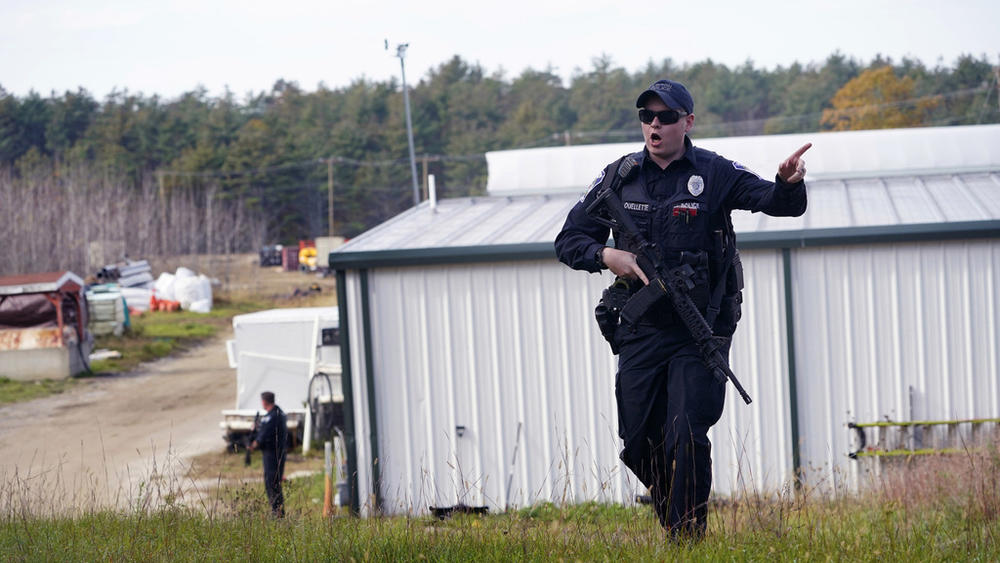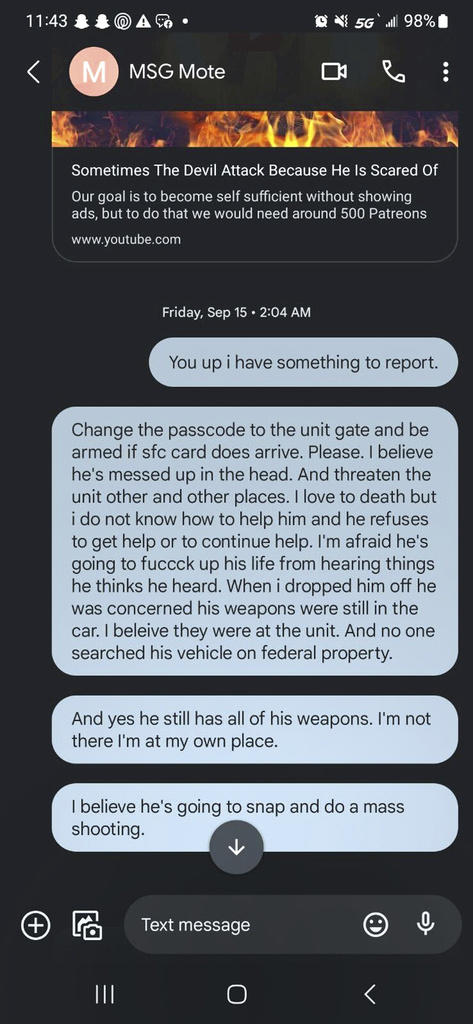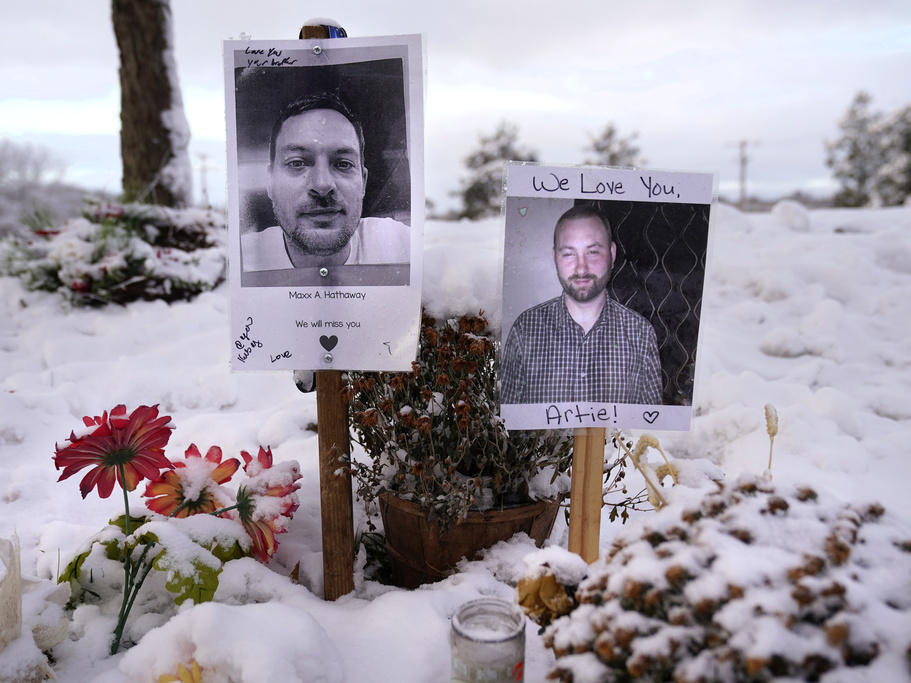Section Branding
Header Content
He warned authorities about the Lewiston, Maine, gunman, but they downplayed his texts
Primary Content
Sean Hodgson watched and worried as his best friend of nearly two decades unraveled. His former roommate and fellow U.S. Army reservist's anger and paranoia were mounting, he had access to guns, and he refused to get help. So Hodgson did the hardest thing of his life: He sent a text about Robert Card to their Army supervisor.
"I believe he's going to snap and do a mass shooting," he wrote on Sept. 15.
Six weeks later, Card fatally shot 18 people at a bowling alley and a bar in Lewiston before killing himself. His body was found in a trailer after a two-day search and regionwide lockdown.
"I wasn't in his head. I don't know exactly what went on," Hodgson told The Associated Press last week in an exclusive interview, his first since the Oct. 25 shootings. "But I do know I was right."
The series of warning signs about Card have been well documented. In May, relatives warned police that Card had grown paranoid, and they expressed concern about his access to guns. In July, Card was hospitalized in a psychiatric unit for two weeks after shoving a fellow reservist and locking himself in a motel room. In August, the Army barred him from handling weapons while on duty and declared him nondeployable.
And in September, Hodgson raised the most glaring red flag, telling authorities to change the passcode to the gate at their Army Reserve training facility and arm themselves if Card showed up.
"Please," he wrote. "I believe he's messed up in the head."
But authorities declined to confront Card — the clearest example of the missed opportunities to intervene and prevent the deadliest shooting in state history. That's hard to swallow for Hodgson, who's pushing back against an independent report for law enforcement that described him as "over the top" and "alarmist."
"I did my job, and I went over and beyond it, and I literally spelled it out for them," said Hodgson, 43, referred to by only his last name in documents related to the case. "I don't know how clear I could have gotten."
Hodgson's account, taken together with law enforcement documents, videos and other interviews, provides the most comprehensive picture to date of potential missteps leading up to the attack.
In replying to AP's questions about the investigation and Hodgson's warning, the Army Reserve said in a statement this week that no one should jump to conclusions until its own investigation and an independent probe by the Army inspector general are finalized.
"Any speculation at this point without having all the details could affect the outcome of the investigation. More details may become available once the investigation is complete," Lt. Col. Addie Leonhardt, Army Reserve spokesperson, said in the statement. Officials wouldn't comment further.
Sheriff Joel Merry — of Sagadahoc County, where Card lived — didn't respond to AP's questions about whether Hodgson's warning was taken seriously enough but suggested a need for public policy changes. He previously said his office has been "fully transparent" and is cooperating with an independent commission appointed by the governor.
Hodgson said he doesn't know where the failings occurred but believes more could have been done to help his friend and prevent tragedy.
"I understand he did a horrific thing. I don't agree with it. But I loved him," he said. " I didn't want any of this for anybody."
A close and supportive friendship
For much of their friendship, Card was "the sensible one," Hodgson said. They met in 2006 in the Army Reserve and became especially close when they both divorced around the same time.
When Hodgson was evicted from his New Hampshire apartment in 2022, Card told him to move to Maine, and they lived together for about a month, he said. When Card was hospitalized in New York in July, Hodgson was the one who drove him back to Maine.
By then, Hodgson said, Card had begun venting to him about his belief that those around him were accusing him of being a pedophile. Hodgson believed some of Card's complaints were true — a case of mistaken identity stemming from the fact that another Robert Card is on the state's sex offender registry — and described an incident at the bowling alley when a father snatched his daughter away from Card after he offered the toddler a hello.
"I always believed him. I always stuck by him," Hodgson said. "I am the closest one to Robert Card. Besides his mother, he pushed everybody away.
"I was the last one he pushed away."
In September, after a night out at the Oxford Casino, Card began "flipping out," Hodgson said — pounding the steering wheel and almost crashing multiple times. After Hodgson begged him to pull over, he said, Card punched him in the face.
"We were having a good night, and he just snapped," he said.
Hodgson told Card to drop him off at a gas station near his house.
"I love you, and I'll always be here for you no matter what," he said he told his friend as he got out of the car.
Hodgson sent his text two days later, telling his training supervisor he feared what Card might do. He didn't speak to Card after that, he said, though they passed each other at work.
"It took me a lot to report somebody I love," he said. "But when the hair starts standing up on the back of your neck, you have to listen."
After his text, Hodgson said, military officials followed up, asking whether Card threatened specific people. He told them he hadn't. But they didn't ask for help in approaching Card, he said, even though they drove trucks for the same company and he knew his friend's schedule and route.
"I could've told them when he was at work, when he was at home, what hours he worked," he said.
Authorities briefly staked out the Army Reserve Center and visited Card's home. They declined to confront him, fearing that would "throw a stick of dynamite on a pool of gas," according to video released last month by the Sagadahoc County Sheriff's Office.
In the videos, officials downplayed Hodgson's warning, suggesting he might have been drunk when he texted at 2:04 a.m. Speaking to police at the training center, Army Reserve Capt. Jeremy Reamer describes Hodgson as "not the most credible of our soldiers" and later tells Sagadahoc Sheriff Sgt. Aaron Skolfield his message should be taken "with a grain of salt."
'All they had to do is listen'
Hodgson, who was unaware of those comments until contacted by AP, acknowledged in a series of interviews that he struggles with post-traumatic stress disorder and alcohol addiction but said he wasn't drinking that night and was awake because he works nights and was waiting for his boss to call.
Hodgson also acknowledges that he faces two criminal charges, one alleging he assaulted a woman he was dating in 2022 and another alleging that he violated his bail conditions by possessing alcohol last month. He's also in hot water for wrecking a military vehicle last summer, he said. But he said authorities should have taken him more seriously given his relationship with Card, his past training on threat detection and mitigation, and his previous work as a security officer at a nuclear plant.
"That was the most difficult thing I ever had to do, was report him to command, and I did that. And for them to discredit me?" he said. "It pisses me off because all they had to do is listen."
In a text message this week, Reamer declined to comment on questions from AP and referred them to Army Reserve public affairs officers.
According to the independent review for the Sagadahoc County Sheriff's Office, officers didn't have sufficient grounds the day they staked out Card's house to force the issue and take him into protective custody after he refused to answer the door. That step is necessary to trigger Maine's "yellow flag" law. It allows a judge to temporarily remove someone's guns during a psychiatric health crisis.
But Stephanie Sherman, an attorney who's represented several families of survivors of the 2022 mass shooting at an elementary school in Uvalde, Texas, said police had more than enough information to take to a local judge.
The videos show officers with a disturbingly casual approach to the threat Card posed, Sherman said. She also noted that Skolfield referred to the Cards as a "big family in this area" and said he didn't want to publicize over police radio that officers were visiting the home.
"It was sort of balancing the safety of the public versus this family's reputation," she said. "And that should not be a factor."
Watching the videos was gut-wrenching for Tammy Asselin, who became separated from her 10-year-old daughter during the chaos of the bowling alley shooting. She said it was the first time she knew for sure that steps could have been taken to prevent the massacre.
"Listening to that interaction between the military and the sheriff, it hurt me to hear the giggle and the laughter in their voice," Asselin said, a tear running down her cheek. "Because I don't think they would be giggling and laughing had they been the ones in my shoes that day, not knowing where their daughter was."
He knew it was Card and where he would go
For weeks after sending the text about Card to their supervisor, Hodgson said he prayed that it wouldn't come true. But as soon as he heard about the shooting, he called his sergeant.
"I don't believe in coincidences," he said he told him. "I know it's Robert Card."
Hodgson was driving to Massachusetts for work that day. He fielded phone calls to and from multiple law enforcement agencies that didn't seem to be communicating with one another, he said.
He said he told authorities right away that Card likely was headed to the Maine Recycling Corp.
Card had worked there, and it wasn't far from the boat launch where his car was found after the shootings. His body would eventually be found there, after initial unsuccessful searches that critics said were too cautious.
More than two months later, Hodgson said, he hates that Card "took the easy way out" and isn't around to answer questions or face the consequences of what he did. It's not the Robert Card he knew and loved for 17 years, he said, and he struggles with that every day.
Hodgson said he wants people to know he did everything he could to save lives.
"I don't know how to express to people how much I loved him, how much I cared about him," he said. "And how much I hate what he did."
Copyright 2024 NPR. To see more, visit https://www.npr.org.



